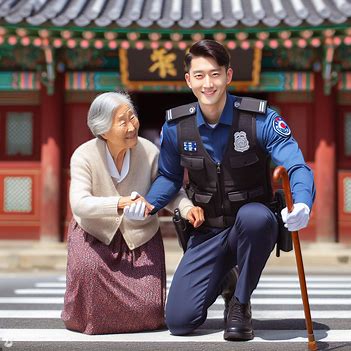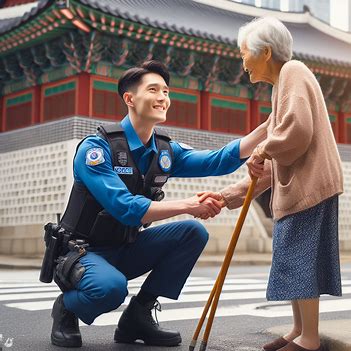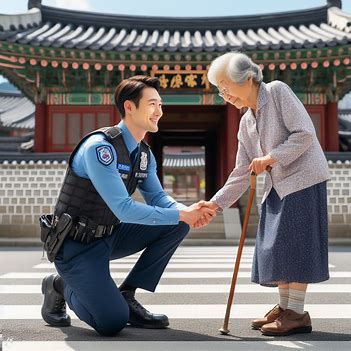
1. Philosophical Reflection on Righteous Human Behavior
1) What is a Righteous Social Order and Human Conduct?
- Views on reconciling conflicts arising from the pursuit of happiness among selfish individuals involve either struggle or compromise.
(1) Thrasymachus -
- Formulation of social order through struggle.
- The only rational and innate mode of action for humans is the pursuit of self-interest. Individual interests are the sole driving force of society.
- The state of a righteous social order is one where the rights of the strong are expressed.
(2) Glaucon -
- Formation of social order through compromise.
- Choosing compromise over freedom, believing that agreements to avoid wrongdoing benefit individuals.
- Both (1) and (2) assume human nature revolves around the pursuit of self-interest. Objective justice is not pre-existing but formed as a result of subjective selfish acts.
(3) Socrates -
- Humans form communities based on their needs, and the formation of these communities inherently possesses correctness.
- Well-established communities exhibit virtues such as wisdom, courage, moderation, and justice when individuals pursue roles aligned with their innate characteristics.
- Social relationships constitute a society composed of individual social duties, and adhering to these duties leads to the just state in society.
- The correctness of individual actions arises not from the rewards of right actions but from the rightness of the actions themselves.
- The harmony of human behavior comes from the balance of intellect, courage, and temperance in the human soul.
(4) Police officers should adhere to the duties assigned by the community, serving the societal good and recognizing that this contributes to the completion of their personal character and internal harmony.

2. Law and Ethics in the Community
1) Law and Ethics in the Community
- Community Definition: A social group where human communal living takes place in a specific area, evolving from a basic organizational unit ensuring minimal survival conditions in primitive times to varying forms like villages, city-states, nation-states, and global states, adapting to different eras and situations.
(1) Community is Always Faced with Threats:
- External threats from other communities.
- Internal threats within the community, including various violations of order.
(2) Social Ethics:
- Efforts to maintain order against internal and external threats, representing the objective spirit of the community.
(3) Objective Ethical Order of the Community:
- Manifests through commands, prohibitions, customs, and conventions, as well as laws.
- The law represents an enforced ethical order.
2) Issue of Just and Unjust Laws:
- Concept of Natural Law:
- Historical development: Adapting to natural principles and complying with divine will in ancient times, evolving to a rational order based on human nature and reason, transcending time, nation, and state in the modern era.
(1) Evolution of Natural Law:
- Ancient: Harmony with nature's principles.
- Medieval: Living according to God's will.
- Modern: Based on human nature and the essence of things, universally applicable beyond time and place.
(2) Concept of Unjust Laws:
- Modern natural law theorists approve the permanence and historical or content variability of natural law.
- Regardless of its reflection of an objective ethical order, a law that does not always represent an unchanging truth but is accepted as an objective ethical order in a specific time and place is not always right. If the law cannot reflect the "objective ethical order accepted by the community" as its content, it becomes an unjust law.
(3) Attitude Towards Unjust Laws:
- Legal Positivism: Emphasizes legal stability and denies natural law, stating that as long as a law is enacted through proper procedures, even an immoral or unjust law should be obeyed. There is an ethical obligation to obey the law even if it is immoral.
- Natural Law Perspective: From the viewpoint of natural law, a law that contradicts the objective ethical order pursued by the community is inherently an unjust law. The right to resist unjust laws is morally and ethically recognized.
3) Unjust Laws, Right to Resist, and Police Exercise of Public Authority
- Political Resistance:
- Challenging legality under the banner of legitimacy, contesting positive law according to natural law, particularly when the legal mechanism within the community cannot resolve it, and the law clearly violates the objective ethical order of the community.
- Conditions for Exercising the Right to Resist:
- When the resistance to legal rights cannot be resolved through existing institutional mechanisms, and the law blatantly violates the objective ethical order of the community.
- The right to resist is characterized by its ultimate and supplementary nature. It should only be used when there is no other way to prevent illegal actions caused by unjust laws.
- Police Response to Citizens' Exercise of the Right to Resist:
- If the violation of the objective ethical order of the community by the law is evident, and resolution through institutional channels is difficult, the police cannot exercise public authority to prevent citizens from exercising their right to resist.
- If the violation is not clear, and resolution through institutional channels is possible, the police, as an enforcement agency, must adhere to existing legal order based on the objective ethical standards of the community.
- The role of the police in a democracy involves managing the balance between participation and obedience in a society with conflicting ideologies.

3. Human Rights
1) Dignity of Human Beings:
- The inherent value of individual human personalities as a spiritual and ethical entity that exists for individuals shaping themselves, regardless of race, gender, faith, social status, wealth, etc.
(1) Kant's Concept of Personality:
- Emphasizes that humans are ends in themselves, not means for others. Human existence itself is the purpose.
- "Act in such a way that you treat humanity, whether in your own person or in the person of any other, never merely as a means to an end but always at the same time as an end."
(2) Personhood in a Respectful Relationship:
- Must be present in a relationship where mutual objectives are respected, and the principle of mutual respect is the fundamental norm of human order.
- Personhood is both the basic principle of human order and the highest ethical norm that constrains human actions.
(3) Human Rights (Legal Expression of Human Dignity):
- Inherent rights that individuals possess by virtue of being human, transcending the constraints of race, gender, faith, social status, etc.
- Declaration of Human Rights adopted by the UN General Assembly in December 1948 aims to protect the basic criteria of human dignity internationally.
2) Human Rights during and after the Industrial Revolution:
- The adverse effects of capitalism, such as wealth disparity, urban issues, and labor problems, led to the legal guarantee of social basic rights to prevent the minimum humane living of alienated classes.
(1) Guarantee of Social Basic Rights:
- Governments, in an effort to prevent social chaos and protect the socially weak, legally began to guarantee
the right to a humane life.
3) Post-World War II (Universalization of Regulations on Social Basic Rights):
- The power of government, while exercised to guarantee basic human rights, inherently poses the potential for human rights abuses due to its nature.
- In December 1948, the UN General Assembly adopted the Universal Declaration of Human Rights to internationally protect the basic standards of human dignity.
4) Modern Human Rights and the Police:
- The concept of human rights continues to expand its influence as international customary law or quasi-constitutional legal status.
- A government's disregard for human rights makes it difficult to gain recognition for its legitimacy domestically and internationally.
- In contemporary democratic societies, law enforcement, including the police, must guarantee basic human rights to establish its legitimacy. Police actions should always consider ethical requests associated with human rights.
1. Summary
Philosophical Reflection on the Right Social Order and Human Conduct:
- A right social order is a rational system based on human nature and reason.
- Right conduct for humans should aim not for self-interest but for the pursuit of virtuous actions as an end in itself.
Law and Ethics in the Community:
- Communities consistently face threats, enforcing an objective ethical order through laws.
- Just laws reflect the community's objective ethical order, while unjust laws go against it.
Unjust Laws, Right to Resistance, and Police Enforcement:
- The right to resistance is the people's ultimate means against unjust laws.
- Police cannot suppress the exercise of the right to resist laws that blatantly oppose the community's objective ethical order.
Human Rights:
- Human dignity implies the inherent right to maintain dignity.
- Human rights are inherent to being human, irrespective of external factors, based on human dignity.
Modern Concept of Human Rights and Police:
- The concept of human rights continues to expand internationally.
- In modern democratic societies, law enforcement must ensure basic human rights to maintain its legitimacy.
- Police, in executing the law, are obligated to uphold fundamental human rights.
2. Key Questions
1. What is the relationship between a righteous social order and human behavior?
A righteous social order is based on human rationality and nature, and righteous human behavior is behavior that conforms to this order. In other words, members of a community should act with consideration for each other's interests and comply with law and ethics.
2. When can the right to resist unjust laws be exercised?
The right to resist unjust laws can be used as a last resort for blatantly unjust laws that were not enacted through due process and for which there are no other solutions. In addition, the exercise of the right to resist can only be justified if it seriously violates the objective ethical order of the community.
3. What is the role of the police in a modern democratic society?
The role of the police in a modern democratic society is to maintain the safety and order of the community while also protecting the fundamental human rights of citizens. To do this, the police must enforce the law and prevent crime, while also respecting the freedoms and rights of citizens.
3. Key Questions
1. Socrates argued that righteous human behavior should follow the objective ethical order of the community, but which of the following is a correct criticism of this argument?
(a) Personal values and the ethical order of the community may not always be consistent.
(b) The objective ethical order of the community may change over time and circumstances.
(c) There is a lot of room for interpretation because the criteria for defining objective ethical order are not clear.
(d) Not all individuals have the ability to choose righteous behavior rationally.
Answer: (a) Socrates' argument presupposes that personal values and the ethical order of the community are always consistent. However, critics challenge this assumption by pointing out that individual conscience or beliefs may conflict with the norms of the community.
2. Which of the following is the most important criterion for distinguishing between legitimate laws and unjust laws?
(a) The appropriateness of the legal enactment process
(b) Whether the content of the law is in line with the interests of the community
(c) Whether the law violates the fundamental rights of humans
(d) Whether the law is effective in maintaining social order
Answer: (c) The most important criterion for judging the legitimacy of a law is whether it violates the fundamental rights of humans. Even if a law is enacted through due process and is in line with the interests of the community, it can be considered unjust if it violates human dignity and fundamental rights.
4. Key Terms
Righteous social order: A social order that is based on human rationality and nature and that is in line with the objective ethical order of the community.
Human behavior: Behavior that is in line with the objective ethical order of the community.
Just law: A law that is in line with the objective ethical order of the community.
Unjust law: A law that violates the fundamental rights of humans.
Right to resist: The right of citizens to resist unjust laws.
Police: A public authority that is responsible for maintaining the safety and order of the community.
Human rights: The inherent rights that all humans possess, regardless of race, gender, religion, social status, or other factors.
'police ethics' 카테고리의 다른 글
| Police organization and police officers (1) | 2024.01.03 |
|---|---|
| Police culture and police mentality (1) | 2024.01.03 |
| Deviations in Police Behavior (1) | 2024.01.03 |
| Desirable Police Model and Professionalization (1) | 2024.01.02 |
| The Modern State and the Social Contract (0) | 2024.01.02 |



